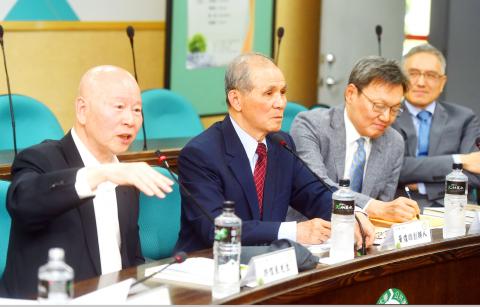Taiwan should not involve itself in the confrontation between the US and China, but should create another path to interact with the two powers to ensure its security, Foundation on Asia-Pacific Peace Studies chairman Hsu Hsin-liang (許信良) told a forum in Taipei yesterday.
The US until this year approached its relationship with China as a constructive partnership, but the US Department of Defense in its annual defense strategy report published in January defined China as “a strategic competitor,” suggesting that the US-China partnership has turned confrontational, Hsu told the regional security forum organized by the Taiwan Research Foundation.
The confrontation would not come to a definite conclusion because neither the US nor China would escalate it to a military conflict, a trade war or Cold War-style diplomatic confrontation, Hsu said.

Photo: Chien Jung-fong, Taipei Times
The US-China relationship would develop into a “protracted, on-and-off process of confrontation and compromise,” which would become the basis for a new world order, Hsu said.
While Taiwan has maintained a healthy relationship with the US, the DPP administration has failed to bridge its political differences with Beijing, Hsu said.
Exports to China account for about 40 percent of Taiwan’s total — four times the volume of Taiwanese exports to the US — so it is necessary for Taiwan to interact with China, Hsu said.
“Regardless of which party holds power in the government, it has the obligation to break the [cross-strait] deadlock,” the one-time Democratic Progressive Party chairman said. “[The ruling party] cannot deny responsibility and the [deadlock] has to be resolved.”
Taiwan should not choose sides in the conflict between the US and China, but should instead interact positively with both countries, Hsu added.
Former Mainland Affairs Council chairman Su Chi (蘇起) told the forum that the possibility of US “playing the Taiwan card” against China has increased.
While the US remains the world’s top military and economic power, its global leadership has been in decline since US President Donald Trump took office, while China has been building up its military and economic presence, Su said.
The US is also experiencing military confusion, Su said, adding that four collisions between US Navy vessels and commercial ships were reported last year and in January last year, none of the US’ aircraft carriers were deployed, contravening standard US practice of always ensuring that at least one aircraft carrier is in operation.
In response to China’s growing power and the US’ diminishing influence, Washington has two options to counter China: launching a trade war against China or playing the Taiwan card with the newly legislated Taiwan Travel Act, which encourages visits between Taiwan and the US at all levels, Su said.
In the past, Taiwan depended on a powerful US, a weak China and Taiwan’s healthy economy to maintain prosperity and dignity, but none of the three factors hold true anymore, Su said.
“To avoid being trapped in a dangerous situation, Taiwan has to adopt hedging measures,” he said.
“While many East Asian countries have adopted hedging strategies and maintained a relationship with the US and China simultaneously, only Taiwan takes a one-sided approach [to build rapport solely with the US],” Su said.
He urged the government to increase efforts to communicate with Beijing to avoid confrontation.

Alain Robert, known as the "French Spider-Man," praised Alex Honnold as exceptionally well-prepared after the US climber completed a free solo ascent of Taipei 101 yesterday. Robert said Honnold's ascent of the 508m-tall skyscraper in just more than one-and-a-half hours without using safety ropes or equipment was a remarkable achievement. "This is my life," he said in an interview conducted in French, adding that he liked the feeling of being "on the edge of danger." The 63-year-old Frenchman climbed Taipei 101 using ropes in December 2004, taking about four hours to reach the top. On a one-to-10 scale of difficulty, Robert said Taipei 101

Nipah virus infection is to be officially listed as a category 5 notifiable infectious disease in Taiwan in March, while clinical treatment guidelines are being formulated, the Centers for Disease Control (CDC) said yesterday. With Nipah infections being reported in other countries and considering its relatively high fatality rate, the centers on Jan. 16 announced that it would be listed as a notifiable infectious disease to bolster the nation’s systematic early warning system and increase public awareness, the CDC said. Bangladesh reported four fatal cases last year in separate districts, with three linked to raw date palm sap consumption, CDC Epidemic Intelligence

US climber Alex Honnold left Taiwan this morning a day after completing a free-solo ascent of Taipei 101, a feat that drew cheers from onlookers and gained widespread international attention. Honnold yesterday scaled the 101-story skyscraper without a rope or safety harness. The climb — the highest urban free-solo ascent ever attempted — took just more than 90 minutes and was streamed live on Netflix. It was covered by major international news outlets including CNN, the New York Times, the Guardian and the Wall Street Journal. As Honnold prepared to leave Taiwan today, he attracted a crowd when he and his wife, Sanni,

Two Taiwanese prosecutors were questioned by Chinese security personnel at their hotel during a trip to China’s Henan Province this month, the Mainland Affairs Council (MAC) said yesterday. The officers had personal information on the prosecutors, including “when they were assigned to their posts, their work locations and job titles,” MAC Deputy Minister and spokesman Liang Wen-chieh (梁文傑) said. On top of asking about their agencies and positions, the officers also questioned the prosecutors about the Cross-Strait Joint Crime-Fighting and Judicial Mutual Assistance Agreement, a pact that serves as the framework for Taiwan-China cooperation on combating crime and providing judicial assistance, Liang